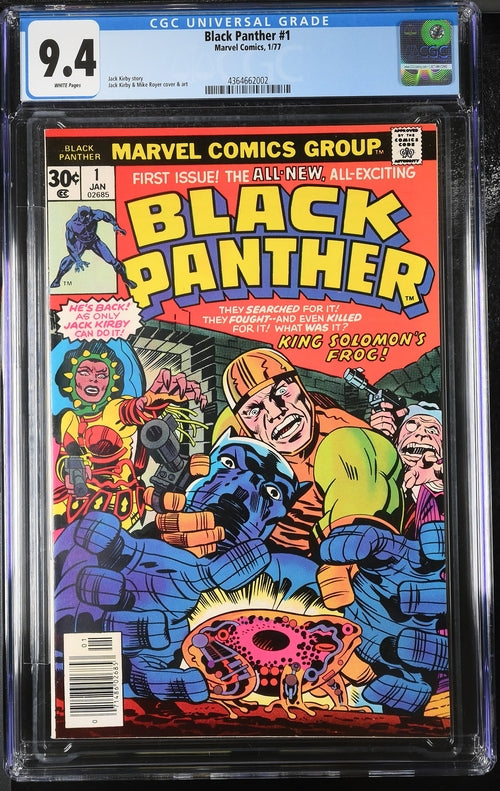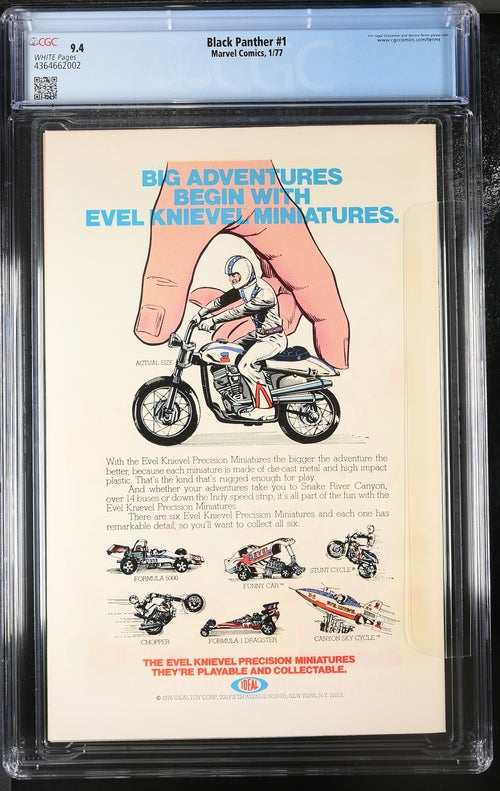Marvel
Black Panther #1 - Marvel 1977 - CGC 9.4 - Jack Kirby / Mike Royer
Black Panther #1 - Marvel 1977 - CGC 9.4 - Jack Kirby / Mike Royer
Couldn't load pickup availability
Share
CGC Cert #4364662002
Black Panther #1 (1977): Wakandan Royalty and the Visionary Legacy of Jack Kirby
In the realm of Marvel Comics, Black Panther #1, published in 1977, stands as a historic milestone that brought the Wakandan king, T'Challa, into the spotlight with his own solo series. Crafted by the legendary Jack Kirby, the co-creator of the character alongside Stan Lee, this inaugural issue not only marks the beginning of an enthralling solo adventure but also adds a significant chapter to the rich history of Black Panther, one of Marvel's most iconic and culturally impactful superheroes.
Black Panther made his first appearance in Fantastic Four #52 in 1966, created by Kirby and Lee. T'Challa, the prince of Wakanda, a technologically advanced African nation, marked a groundbreaking moment in comic book history as one of the first black superheroes. The character's introduction was a notable departure from the predominantly white superhero landscape, and it showcased Marvel's commitment to diverse representation.
By 1977, with the release of Black Panther #1, Jack Kirby had already established himself as a titan in the comic book industry. Known for his co-creation of characters like the Fantastic Four, Thor, and the X-Men, Kirby's artistic and storytelling prowess was unparalleled. Bringing his visionary talent to the Black Panther solo series, Kirby elevated the character to new heights and immersed readers in the vibrant world of Wakanda.
The first issue of Black Panther wastes no time in thrusting readers into the heart of the action. T'Challa, now the reigning king of Wakanda, grapples with challenges both internal and external. Kirby's narrative unfolds with a blend of political intrigue, superheroic exploits, and a deep dive into Wakandan culture. From the majestic Panther God Bast to the Dora Milaje, Wakanda's all-female special forces, Kirby weaves a narrative tapestry that showcases the diversity and depth of the fictional African nation.
One of the defining aspects of Black Panther #1 is Kirby's intricate world-building. Wakanda isn't just a backdrop; it's a character in itself. The advanced technology, the mystical traditions, and the societal structure provide a unique and immersive backdrop for T'Challa's adventures. Kirby's dedication to portraying Wakanda as a multifaceted and dynamic society was groundbreaking, challenging stereotypes and opening up new possibilities for storytelling in the superhero genre.
The issue also introduces an array of characters, both allies and adversaries, who would become integral to the Black Panther mythos. From the wise and loyal Zuri to the enigmatic and dangerous Erik Killmonger, Kirby populates Wakanda with characters who contribute to the complexity of T'Challa's world. This attention to character development enriches the narrative and sets the stage for future story arcs.
Kirby's artwork in Black Panther #1 is nothing short of spectacular. The dynamic action sequences, the detailed depictions of Wakandan landscapes, and the regal presence of T'Challa are all rendered with a level of craftsmanship that solidifies Kirby's status as a comic book legend. The visual language employed in the issue not only complements the narrative but also elevates the storytelling, making it a visually stunning and engaging experience for readers.
Beyond the superheroics, Black Panther #1 touches upon relevant themes such as leadership, responsibility, and the tension between tradition and progress. T'Challa's internal struggle as a monarch torn between tradition and the demands of the modern world adds layers to the character, elevating him beyond a mere superhero into a symbol of the evolving dynamics of leadership.
Moreover, the publication of Black Panther #1 was a cultural event that resonated far beyond the comic book pages. In an era where diversity in mainstream superhero comics was limited, the prominence of a black superhero and the exploration of an African nation that was technologically advanced challenged prevailing stereotypes. Kirby's portrayal of Wakanda as a thriving, self-sufficient nation defied preconceived notions and laid the groundwork for a more inclusive representation in the comic book medium.
The legacy of Black Panther #1 extends beyond its immediate impact. The series, under Kirby's guidance, continued to explore T'Challa's adventures and Wakanda's role on the global stage. Black Panther became a symbol of empowerment for readers who sought representation in the superhero genre. The character's enduring popularity was further solidified with subsequent creative teams, cementing Black Panther as a cornerstone of Marvel's pantheon of heroes.
In conclusion, Black Panther #1 (1977) is a testament to Jack Kirby's visionary storytelling and the groundbreaking nature of T'Challa as a character. The issue not only provides a captivating introduction to the Black Panther's solo adventures but also contributes to the ongoing legacy of diversity and representation in comic books. Jack Kirby's creative brilliance, coupled with the cultural significance of Black Panther, makes this inaugural issue a milestone that transcends its publication date, leaving an indelible mark on the world of superheroes and inspiring generations of readers.
Product Dimensions: 13" x 9" x 1"




